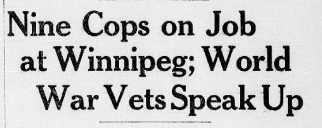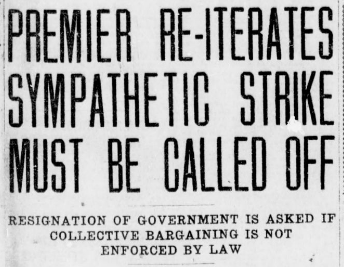 ———-
———-
Hellraisers Journal – Tuesday June 3, 1919
Winnipeg, Manitoba – Soldiers and Police Support General Strike
From The Butte Daily Bulletin of May 31, 1919:
(Special United Press Wire.)
Winnipeg, May 31.-The police force now consists only of nine men, 181 officers having automatically been discharged yesterday when they refused to sign an agreement with the city severing their connections with labor.
The policemen had voted their approval of the demands in the general strike, but had not voted to strike themselves. An effort is being made to have the mounted police do the city patrolling.
Returned soldiers asked that the principle of collective bargaining be placed in the provincial statutes and also asked that the city officials with draw their demands on the police.
———-
[Emphasis added.]
From the Winnipeg Strike Bulletin of June 2, 1919:
THE SOLDIER AND THE STRIKE
The severest jolt the financial magnates of Winnipeg ever got was administered by the returned soldiers early in the strike, when the mass meeting representing all the returned soldier bodies reversed the decision of the combined executives and threw in their lot with the strikers.
Since that time these employers have chafed with chagrin and disappointment. They had spent so much time and printers’ ink and so many beautiful words on the returned soldier. They have met him as he left the ship and the train with select news items. They met him with brass bands and tinkling cymbals and honied phrases. They pointed out to him the traitorous acts of LABOR while they, the soldier, fought. Labor was their enemy-the masters were their friends.
And now: Presto–Dormer and Blitzen-their campaign was a “dud.” Their “black besses” failed to explode. Something is wrong.
The Soldier Fought and Fought
The soldier can’t be white-livered. No one can call him yellow. His feet are not cold. When he went over the top he silenced all suspicions and overcame all opposition.
What Then is the Matter?
What is the matter? Well he damned the politicians while he tried to “carry on” with a Ross rifle. Jambing rifles while men fall all around don’t make contented soldiers. He cursed as he choked in trying to swallow the Ironsides soldiers’ meats. He inwardly fumed to see his $1.10 a day melt against the sudden “rise in prices.” He ground his teeth while he read his wife’s letters telling him how she tried so hard to make ends meet on her small and ever-smaller “allowance.” It did not take him long to think of the Hun in Canada-the Hun behind his back. He does not love him today.
Then upon his return he finds a pension awaiting him that is a positive insult. It is so niggardly as to shame the very devil. He thinks hard as he sees the difference between his pension and that of Colonel Sir Punk. He wants to know why, and why and why?
Just as soon as he is discharged and looks for a job he faces life once more as it really is. If he is partially disabled, and has a pigmy pension, he finds Sir Augustus Nanton writing a letter like the following:
This is an extract from a letter received by a returned soldier who won a D. C. M., and lost a leg, from Sir Augustus Nanton. Lady Nanton was Auxiliary President of the battalion to which the man belonged.
Sir Augustus writes:
“In your case, I have no doubt that, in addition to your salary, you are receiving some partial disability allowance from the Government, which, I sincerely trust, together with your salary, brings in to you an income which will enable you to live.
“Yours truly,
“(Signed) A. M. NANTON.”The letter needs no comment. One such letter is sufficient to do its work with any soldier.
Then he turns around and finds a Lieutenant-Governor paying another returned man $13.00 a week. Others get 31 cents an hour. The railways offer 32½ cents an hour. And at wages such as these he cannot find employment.
Where women are concerned things are no better. Restaurant girls get as low as $15.00 per month. Women who work cleaning offices at night get $15.00 per month. And all along the line it is unemployment and low wages.
Low Wages and High Prices
The low wages would not matter if prices were also low. But prices are controlled by trusts, and combines, and banks, and milling interests, and grain exchanges, and pork packers, and all the long line of profiteers and parasites.
They own cars and mansions and declare their dividends on an ever-increasing scale. They boast of their growing wealth, while he pays a tax on matches, and on tobacco, and on tea, and sugar, and shoes, etc., until a dollar buys only half as much as formerly. He has quit fighting-but he still thinks, and he says, at last, well, I guess we shall have to fight once more.
So he lines up the friends and foes, and his thinking has led him to see his present enemies in the men who buy full page advertisements in the daily press for tariffs, and tirades against labor. He sees his friends in the men against whom these things are aimed.
He Acts Only When He Knows
He does not act in a hurry. He has been taught to wait. So he waits until he gets the facts. Then he acts.
He has decided that the profiteer is the real Bolshevist, and he has signed up against the profiteer. That is why he is in the ranks of the strikers.
He has read the daily press with growing hostility during the last ten days. He has heard himself described as an alien, led by anarchists; so at last he marches to the Parliament Buildings and asks the Premier the question: “Do you call us aliens and Bolsheviks?” The Premier has but one answer. That is-No!
Then says the soldier: “You must cut this stuff out of your campaign against us strikers; and you must cut it out of your press!”
He Protests Against Injustice
He also sees the real nature of the contemptible campaign of vilification of labor leaders, and he tells the Premier you must cut this out too. We have had all we intend to take of it.
He takes the same stand re the policemen. As a soldier, he has as a class passed the stage of fear, and so the soldier body told the Premier in plain language, that he must see that that ultimatum was withdrawn. Then he gave three cheers for the police.
The absolute unscrupulousness of the employing class is seen clearly by the soldier. He knows what machine guns mean in a mob, and he has found out that he-the returned soldier, with the other strikers-is the mob; so once again he issues a warning, and said once again quite plainly, if you call out the soldiers, you will find that two can play at that game.
Just how much lies behind that lone voice is impossible to tell. But, as the returned soldier demands a living wage and the right to collective bargaining, and says he will “carry on” until he gets it, his cry that he can play with guns bears a fearful import.
He Must Get Justice
He smarts under his disadvantages. He has no hall where he can meet en masse. While there are 10,000 returned soldiers, the city hall holds less than a thousand. It seems that he cannot have the Industrial Bureau because the Committee of 1000 has leased it for the period of the strike.
What road hogs they are. They have a monopoly of everything. They own the earth; they dictate over the whole of the soldiers’ existence. He has obeyed, and has been ordered about as long as he can stand it, he says; “I fought for Justice and Liberty and now I want a little bit of it.” This is why the returned soldier has lined up behind the strikers.
It is for him another fight for Justice, and he has said we shall “Carry on,” until the fight for a living wage and the right to organize is won.
———-
[Emphasis added.]
From The Winnipeg Evening Tribune of June 2, 1902:
—–
BULLETIN
From the parliament buildings the crowd marched down Broadway to Main st., thence north to the Board of Trade building. There all signs designating the building as the headquarters of the Citizens Committee of One Thousand [organized May 16 to fight the general strike] were torn down while the crowd cheered and “booed” alternately. The doors of the building were shut by persons at work inside the building.
—–
A crowd of returned soldiers and strike sympathizers, estimated at between 3,000 and 5,000 persons, marched to the parliament buildings this morning and demanded resignation of the Norris government unless it would promise legislation for compulsory collective bargaining.
Premier Norris reiterated his conviction that no legislation could be promised until the sympathetic strike was called off. he said that the government could not resign unless the people of the province [Manitoba] demanded its resignation in a constitutional manner.
The soldiers told the premier they would return Tuesday morning at 11 o’clock to receive his definite statement as to whether he would call a special session of the legislature or put machinery in motion to take a referendum to find out whether the electors of the province want legislation to make collective bargaining compulsory.
The crowd was orderly throughout the meeting and no Union Jacks were molested. The bulk of the crowd stood outside the building and echoed the cheers and “boos” of the 500 who were admitted. No interruptions marked the proceedings as was the case Saturday [May 31st]. The crowd, although twice as large as that of Saturday, was not keyed up to the same emotional pitch, and there was less applause.
Demonstrations were made at stores on the march to and from the capitol, and the Board of Trade on the return march. The stores were “booed” and the headquarters of the Citizens’ committee were hissed by the marchers……
———-
[Emphasis added.]
~~~~~~~~~~~~~~~~~~~~~~
SOURCES & IMAGES
Quote Returned Soldiers re Wpg GS, Strike Bltn, June 2, 1919
https://archive.org/details/savingworldfromd00winn_0/page/94
The Butte Daily Bulletin
(Butte, Montana)
-May 31, 1919
https://chroniclingamerica.loc.gov/lccn/sn83045085/1919-05-31/ed-1/seq-1/
The Winnipeg Strike Bulletin
(Winnipeg, Manitoba, Canada)
-June 2, 1919
From:
The Winnipeg General Sympathetic Strike
[of] May-June, 1919
-by the Defense Committee
Winnipeg Manitoba, 1920
“The Soldier and the Strike”
https://archive.org/details/savingworldfromd00winn_0/page/90
The Winnipeg Evening Tribune
(Winnipeg, Manitoba, Canada)
-June 2, 1902
https://digitalcollections.lib.umanitoba.ca/islandora/object/uofm%3A1692953
See also:
Tag: Winnipeg General Strike of 1919
https://weneverforget.org/tag/winnipeg-general-strike-of-1919/
Also from Strike Bulletin of June 2, 1919:
-“Soldiers Back Strikers to Limit”
https://archive.org/details/savingworldfromd00winn_0/page/84
More sources for:
“Saving the World From Democracy”
The Winnipeg General Sympathetic Strike
May-June 1919
-by Defense Committee, Delegates from Labor Organizations of
Winnipeg, Manitoba, 1920
https://babel.hathitrust.org/cgi/pt?id=uiuc.2575433_001;view=2up;seq=1
http://debs.indstate.edu/w776s3_1920.pdf
http://peel.library.ualberta.ca/bibliography/4548.html
~~~~~~~~~~~~~~~~~~~~~~~~~~~~~~~~~~~~~~~~~~~~~
Joe Hill on the General Strike




